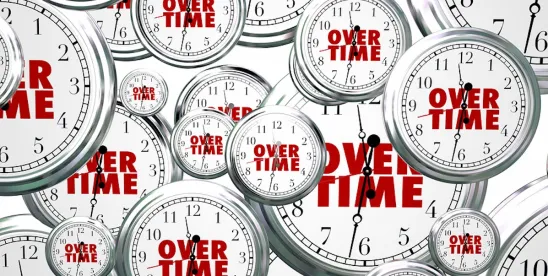For nearly a year, we have been tracking (see here and here) the US Department of Labor’s (DOL) Final Rule modifying the salary requirements applicable to US employees who are exempt from the Fair Labor Standards Act’s (FLSA) overtime requirement under the executive, administrative, and professional (EAP) “white collar exemptions.” The Final Rule is scheduled to go into effect on July 1, 2024, so, barring judicial action in the remaining business days this month, US employers must prepare for these significant regulatory changes.
Effective July 1, 2024, the salary threshold for EAP-exempt workers will increase from the current rate of $684/week ($35,568 annually) to $844/week ($43,888 annually). The salary threshold is slated to increase again on January 1, 2025, to $1,128/week ($58,656 annually). Thus, barring judicial action between now and July 1, 2024, employees who are currently treated as exempt from overtime as EAP-exempt workers must be paid overtime if they work more than 40 hours per workweek unless they receive a salary of at least $844/week.
The Final Rule also modifies the salary threshold for highly compensated employees (HCEs). HCEs are paid on a salary basis and perform office or non-manual work and at least one of the exempt EAP duties. Under current DOL regulations, HCEs must earn a salary of at least $684/week and receive total annual compensation of at least $107,432. However, beginning July 1, 2024, HCEs must be paid at least $844/week on a salary basis and their total annual compensation must equal or exceed $132,964. Then, effective January 1, 2025, HCEs will need to be paid at least $1,128/week on a salary basis and earn a total annual salary of at least $151,164 to remain exempt.
The Final Rule has been the subject of three major legal challenges:
- On May 22, 2024, a group of businesses and business associations filed suit in the Eastern District of Texas, asserting that the DOL exceeded its authority in adopting the Final Rule. (Complaint, Plano Chamber of Commerce, et al. v. Su, 4:24-CV-468 (E.D. Tex., filed May 22, 2024).)
- On June 3, 2024, the State of Texas filed suit – also in the Eastern District of Texas – seeking a preliminary injunction delaying the effective date of, and a permanent injunction enjoining the enforcement of, the Final Rule. (Complaint, State of Texas v. Dep’t of Labor, et al., 4:24-CV-499 (E.D. Tex., filed Jun. 3, 2024).)
- Also on June 3, a software company filed suit seeking preliminary and permanent injunctive relief enjoining the Final Rule. (Complaint, Flint Avenue, LLC v. Su, et al., 5:24-CV-00130-C (N.D. Tex., filed Jun. 3, 2024).).
As the Plano Chamber of Commerce and State of Texas lawsuits were both filed in the same Court and assigned to the same trial judge (Hon. Sean D. Jordan), the court suggested consolidating the cases, with the State of Texas challenge as the lead case. [See 4:24-cv-00468-SDJ, ECF No. 7 (Jun. 5, 2024).] The Plano Chamber of Commerce plaintiffs filed a notice on June 7 agreeing to consolidate their lawsuit with the State of Texas case, and further consenting to the court holding a hearing on Texas’s motion for injunctive relief on June 24, 2024. The DOL filed a notice opposing consolidation, but it has agreed to a hearing on State of Texas’s motion for preliminary injunctive relief on June 24.
Although it is possible the court may issue a decision enjoining the Final Rule before the July 1 salary threshold increases, prudent employers will take these final days to identify the employees who require salary increases or reclassification before July 1, 2024 in the event the Final Rule is not enjoined. We will continue to update the blog with developments after the June 24 hearing.




 />i
/>i


